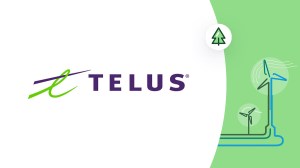TELUS, a leading wireless service provider, turned to Net Zero Cloud to understand emissions across its entire value chain and provide stakeholders with investor-grade carbon accounting that is accurate, compliant, and transparent.
Driving the news: As TELUS continues to work toward carbon neutrality by 2030, it is also facing more complex disclosure requirements around Scope 3 emissions.
In 2011, TELUS announced initial climate targets of 25% reduction in greenhouse gas emissions and 10% reduction in absolute energy usage by 2020. With insights from Net Zero Cloud, TELUS has since identified science-based targets and a path to net zero. Its goal of carbon neutrality by 2030 includes a 46% reduction in emissions without offsets and a Scope 3 target of 75% intensity reduction.
“Engaging with our value chain and hitting our Scope 3 targets will have such a huge impact,” said TELUS Sr. Sustainability Strategy Manager, Terry Hickey. “Our Scope 1 and 2 emissions are 253,000 tonnes, which is a lot but very small compared to our Scope 3 emissions, which are over three million tonnes per year.”
Engaging with our value chain and hitting our Scope 3 targets will have such a huge impact. Our Scope 1 and 2 emissions are 253,000 tonnes, which is a lot but very small compared to our Scope 3 emissions, which are over three million tonnes per year.
Terry Hickey, Sr. Sustainability Strategy Manager, TELUS
Why it’s important: Scope 3 emissions are indirect emissions produced by a company’s value chain (upstream in the supply chain and downstream in distribution channels and customer use). They are challenging to track because the data is housed in siloed systems and often requires input from third parties. However, accurately capturing this data is critical to calculating a company’s true carbon footprint as value chain emissions can account for the majority of a business’s emissions.
As reporting grows increasingly complex and detailed, companies need to find accurate, real-time, automated systems to manage the data.
“When it comes to sustainability reporting, you never have to report less,” said Hickey.
Zoom out: Net Zero Cloud pulls TELUS’ data from a variety of locations, both internally and externally, accessing more than 300,000 records annually. Records include the amount of diesel fuel burned, fuel fill-ups, generator use, prime power usage, remote locations, and environmental spill-and-release reporting – and that’s before supply chain data is tallied.
The TELUS team uses Net Zero Cloud to collect and organize all this information into one dashboard that shows overall progress while drilling down to identify specific areas for improvement. It can aggregate important sustainability metrics within minutes.
The customer perspective: “Net Zero Cloud has helped reduce the number of discrepancies in our sustainability calculations,” said Hickey. “The math is simple, but with so many inputs, there’s so much room for human error. Net Zero Cloud offers a consistent approach and calculation for everything, so we know we’re accurate and transparent with our stakeholders. We’re also able to plan and execute on our climate action goals much more effectively.”
Net Zero Cloud offers a consistent approach and calculation for everything, so we know we’re accurate and transparent with our stakeholders. We’re also able to plan and execute on our climate action goals much more effectively.”
Terry Hickey, Sr. Sustainability Strategy Manager, TELUS
Explore further
- Read how Salesforce is integrating sustainability into its core values.
- See how JetBlue is using Net Zero Cloud to accelerate the airline industry’s transition to net zero.
















